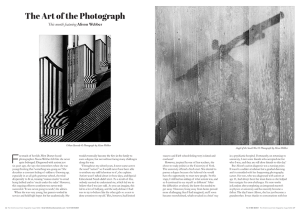Fergus Byrne meets Alison Webber

For much of her life, West Dorset-based photographer Alison Webber felt like she never quite belonged. Diagnosed with autism just six years ago, she says she remembers when she was young thinking that ‘something was going on.’ She describes a constant feeling of oddness. Growing up, especially in an all-girls grammar school, she tried desperately to fit in, wearing ‘various masks’ to avoid being bullied and to ‘sneak under the radar.’ However, this ongoing effort to conform was never truly successful. ‘It was never going to work,’ she admits.
When she was very young, her parents worked in service and held high hopes for her academically. She would eventually become the first in the family to earn a degree, but not without facing many challenges along the way.
‘Throughout my school years, I never came across the word “autism” so I would never have been able to attribute my odd behaviour to it’, she explains. Autism wasn’t talked about in those days, and Special Educational Needs didn’t exist. ‘As a result of this, nobody seemed to understand me, which led me to believe that I was just odd. As you can imagine, this led to a lot of bullying, and the only defence I had was to try to behave like the other girls so as not to draw attention to myself. This, however, had limited success and I left school feeling very isolated and confused.’
However, inspired by one of her teachers, she chose to study politics at the University of York. The university offered a fresh start. She elected to pursue a degree because she believed she would have the opportunity to meet new people. ‘At this stage, I still had no inkling of what autism was, and so I continued to see myself as different.’ After the difficulties at school, she knew she needed to get away. ‘However, living away from home proved more challenging than I had imagined, and I soon became overwhelmed, which resulted in a brief stay in a psychiatric hospital. Fortunately, on returning to university, I met some friends who accepted me for who I was, and they are still close friends to this day.’
But Alison’s autism diagnosis was a turning point. It wasn’t a sudden revelation but a gradual dawning, and it coincided with her burgeoning photography career. Her son, who was diagnosed with autism at age 11, had always been her main focus as she helped him navigate his own challenges. He now works in London after completing an integrated master’s in physics at university and has recently become a father. The day I meet Alison, she has just become a grandmother. It was thanks to conversations with her son and husband that she decided to find out more about her own unusual traits. ‘My autism diagnosis has been invaluable to me,’ she says. ‘The diagnosis has made me more aware of my behaviour, enabled me to understand myself better, and recognise and accept my autistic traits as part of my individuality. It has also helped my family understand why I behave the way I do.’
After university, Alison worked for a bank before tutoring primary school children in maths and English. ‘I really loved that,’ she says of the teaching, though she admits she didn’t enjoy the bank work at all. Moving to France, she continued to enjoy teaching, but when she returned to England, she found the education system too hard to navigate. ‘The main two things which put me off teaching in England were the behaviour issues within schools and the increasing lack of support for pupils with special educational needs,’ she explains.
Photography was to become her primary focus, and her diagnosis had indeed changed everything. ‘With regards to my photography, my ability to understand and accept my autism has given me the confidence to express my individuality through my images. I no longer take photos in the hope that other people will like them. I take photos for me, and if others like them, then that is a bonus.’
However, she believes a diagnosis is not for everyone; ‘not everyone wants to know that,’ she says. But the benefit of knowing has helped both her son and her to navigate challenges, giving her confidence and allowing her to develop her natural photographic eye.
‘I fell in love with photography after a trip to Nova Scotia’ she says, ‘and it snowballed from there.’ She recalled visiting a lighthouse at Peggy’s Cove when a man came running towards her, excited by an amazing reflection of the lighthouse in a rock pool. She photographed it, and the experience motivated her to pursue further photography. ‘After a period of time capturing “classic” landscapes, I began to experiment with a less conventional photographic style,’ she says, ‘I discovered that I was drawn to taking pictures of patterns and shapes in monochrome.’
When she returned to Dorchester, she went to a photography exhibition. ‘I had just got into photography,’ she remembers, ‘and I very boldly said to the steward at this exhibition, I’d like to join their group. He was very diplomatic and sort of gently moved me away from that topic, and suggested I join a camera club, which I did.’
Alison then completed her Royal Photographic Distinctions, LRPS, ARPS and FRPS, at a rapid pace due to her love of deadlines and structure. ‘One of the main things about my autism is needing to have focus on projects and deadlines,’ she explains. ‘I absolutely love deadlines, because I like to have something to work towards. So putting a panel of images together for the RPS, I thought, “this is just me.”’ Using her natural aptitude for light and visual awareness, she presented her images while submitting the written work as a series of poems. ‘I don’t think anyone had ever done that before. I love writing poetry, so it made sense to me.’
In August, Alison will participate as part of Dorset Independent Photographers at Borough Gardens House in Dorchester. Combining her passion with train travel, she says she can be mesmerised by the views outside as a train navigates its way through the countryside and towns. She is creating a series of images titled Through the Window, which captures those moments. She will also participate in an exhibition of the Dorset Monochrome Collective, a group founded in 2018.
From September and throughout the winter months, she will be giving talks to various camera clubs on the subject of autism and photography. She hopes to increase awareness and understanding not only of autism but also of the concept of individuality within the field of photography. ‘I see it in some photography clubs where people are all tied up with the latest photography trends, and they’re trying to keep up with those trends. People tell me it’s really difficult to let go of that, and they’re trying to please judges in competitions, instead of stepping back and asking, “What do I really want to do?”’
She explains that her talk, entitled The Cloak of Conformity and the Corset of Expectation, is a combination of awareness of autism and how it can be viewed in a positive light. ‘It can be viewed in a negative light or, at the very least, totally misunderstood’, she says. ‘But there are so many positives. I think it’s really good to put autism in a positive light and say, it’s not negative, it’s different.’
From August 22nd to 31st, 2025, Alison will participate in a joint exhibition as part of Dorset Independent Photographers at Borough Gardens House, Borough Gardens, Dorchester. For more information about her work, upcoming exhibitions, and talks, visit https://alisonwebber.co.uk.



